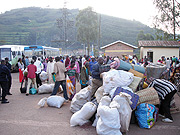We arrived at Gatuna border post at around 5.30pm on the evening of May 14, just as dusk fell on the surrounding hills. Already, the 201 returnees had crossed the border into Rwanda from the camps in southern Uganda, and were now waiting to be taken to the capital.


We arrived at Gatuna border post at around 5.30pm on the evening of May 14, just as dusk fell on the surrounding hills. Already, the 201 returnees had crossed the border into Rwanda from the camps in southern Uganda, and were now waiting to be taken to the capital.
The scene into which we stepped was somewhat chaotic. A mountain of baggage lay to one side – mattresses, straw sacks and suitcases all piled haphazardly on the ground – and people were rushing everywhere, gathering their things up and loading them into the waiting truck.
According to government officials at the site, among the assembled crowd were 94 children and 60 women.
They are among the first Rwandan refugees in Uganda to return to their home country as part of an immense repatriation operation headed by UNHCR. The operation, which began on May 12, will see all the estimated 20,000 refugees in Ugandan camps return to Rwanda by the end of July this year.
When the genocide began in April 1994, thousands fled the violence, crossing the border into neighbouring countries such as DR Congo and Uganda. Many of the refugees have not stepped foot on Rwandan soil since.
The consensus among those gathered in the car park at Gatuna was that they were glad to be returning to Rwanda.
One man, who preferred not to be named, described this as a "happy” moment for him and his family and said that they were looking forward to going back to their village in the Eastern Province. Patricia Kamaraba, too, said she was glad to be back – "We were well looked after in the camps. But the land wasn’t ours. We were tired of being called ‘refugees’”.
Kamaraba told us that she still had a son and two daughters in Uganda awaiting repatriation, but that they were registered and would hopefully be following soon. As she spoke, a small child clung to the folds of her dress.
Like many of the children here, she was born in the camp and has never known the country of her parents. Now, for the first time, she will see her homeland.
Her apprehensive behaviour showed the uncertainty which was felt by every one of the group as they waited for deliverance in this strange state of limbo on the border – between two countries, between the camps and their homes, between refugee and returnee.
However, there have been some issues with the repatriation process, some of the refugees showing reluctance to return.
The man I spoke to explained that there had been rumours going round the camps that those who returned would be putting their lives at risk. Reports had found their way back to the refugees of ‘solidarity camps’ in Rwanda, where returnees were taken and killed.
Others had their own reasons to avoid return.
Kamaraba told us how she had returned to Rwanda once before in 2006 and had found herself arrested without reason, an experience which had frightened her and convinced her to stay in Uganda. She had also heard rumours that they would be "taken to European countries” if they stayed.
But the government has taken active steps to inform people of the truth and dispel their fears. The Minister of Local Government, Protais Musoni stated, "they just lack enough information about their country… we are preparing to send a team to give them the real picture of what Rwanda is.”
As the sun fell below the hills to the west, the returnees began piling into the buses which would be taking them to the Red Cross headquarters in Kigali. There, they would spend their first night in Rwanda in fifteen years.
The previous morning, they had been issued with three month’s worth of food and provisions – maize, beans and cooking oil – before meeting their local government officials and being taken to their respective districts.
Innocent Ngango Rubuga, Executive Secretary of the National Council for Refugees, stated that "everything went smoothly. The returnees started leaving for their districts early in the morning”.
The Mayor of Gatsibo, Vianney Murego, was at the scene to welcome the 74 people who would be returning to the various sectors across his district. He told The New Times "the returnees are in a good condition and are ready to be taken back to their homes”.
The scenes of the last few days are just one small part of a much wider operation to repatriate the estimated 20 000 Rwandan refugees still living in south Uganda. The process marks an important step towards rebuilding society in the aftermath of the 1994 genocide.
The fact that these refugees would prefer to come back to Rwanda instead of staying within the guaranteed security of the camps is a testament to the stride the country has come in the last fifteen years.
The next big challenge will be ensuring that these returnees, many of whom have spent most of their lives in the camps, are reintegrated into society and given all the support they need to establish a new life in Rwanda. As Anne-Marie Ntamitondero aptly put it, "we can’t have a future in a foreign country”; now back in her own land, she can begin to build a future for her and her family.
E-mail: mattalagiah@hotmail.com


